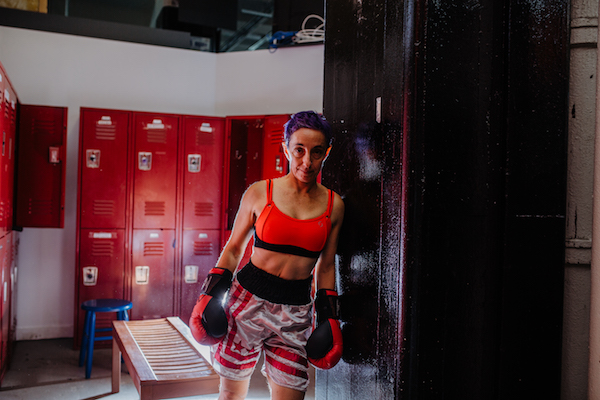Quill Kukla’s parents were non-conventional adventurers who never made Kukla feel the need to be conventional in any way. Kukla credits that upbringing as one reason for personally being able to build a life of defying societal conventions in order to live life to the fullest.
Kukla not only serves at Georgetown University as Professor of Philosophy and Senior Research Scholar at the Kennedy Institute of Ethics, they also are a competitive boxer and weightlifter at age 51.
Kukla’s journey into these norm-busting identities began when Kukla entered their 40s and realized walking and biking were no longer sufficient to keep their aging body in shape. So, at age 42 they got into the gym, got a trainer, and from there, discovered weightlifting and boxing. Surprising even themselves, by age 45, Kukla was competing seriously in both sports, and they’ve continued to do so ever since. And, amid their boxing journey, Kukla discovered something else about themselves that defied conventions: their gender identity.
Growing up, Kukla loved ballet. It gave them a feeling of strength, and the sense of challenging what their body could do. However, Kukla never liked the high femme environment of ballet.
“It always felt kind of gender dysphoric to be in that environment… but I didn’t have the words for that, and I really didn’t have the imagination for what else I could do with my body,” says Kukla.
They eventually quit dancing partly because they felt too out of place. In boxing, they’ve found the same thrill of strength feeling, but doesn’t feel the genderization ballet had. This allowed Kukla to begin thinking of themselves as non-binary.
Coming out was generally smooth for Kukla, within both the Georgetown academic, and boxing communities. Kukla has faced attacks from philosophy academics outside of Georgetown, and gender identity is more problematic in weightlifting, but nothing has stopped Kukla from being themselves in those spaces and in general.
Kukla modestly has embraced being a role model as a non-binary individual in academia and in weightlifting and boxing.
“I hope that just because I’m so willing to be myself… and not fit into traditional categories, I hope it’s inspiring,” says Kukla.
For their own future, Kukla hopes to continue boxing competitively for some time, then eventually transition into coaching youth boxing in a non-gendered way. They also plan to take up fencing to replace boxing when the time comes.
“I feel like it has the same thrill as boxing but is maybe a little less likely to end in concussion,” says Kukla. “At some point I’m going to feel like I’ve taken enough punches to the head.”
That sums up Kukla well. They’re not afraid to take punches, and any changes they make to their life are on their own terms – it’s all about fighting to live fully and authentically, swinging for new challenges along the way.

